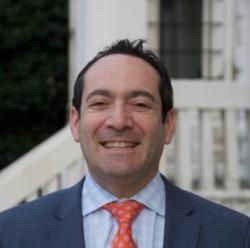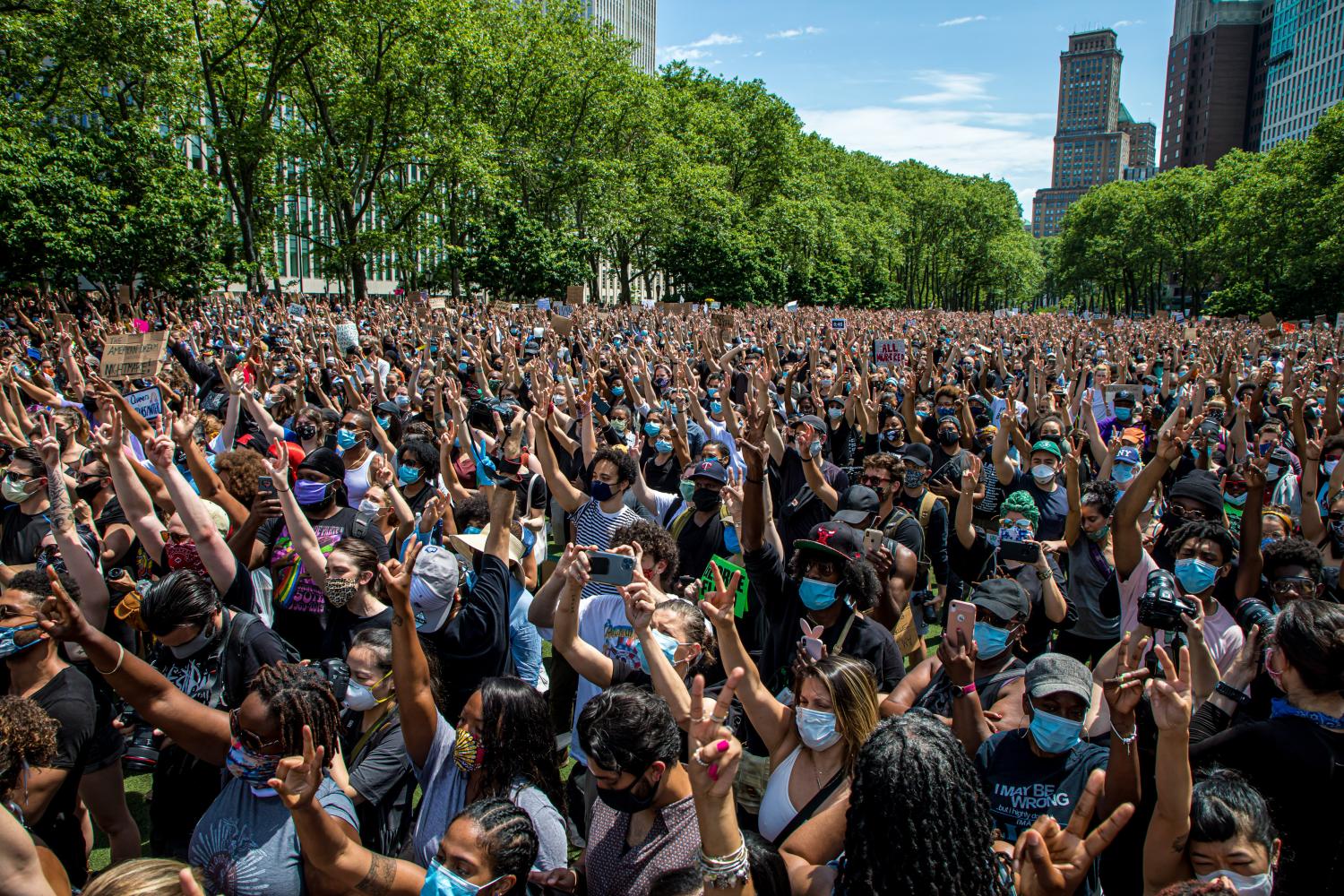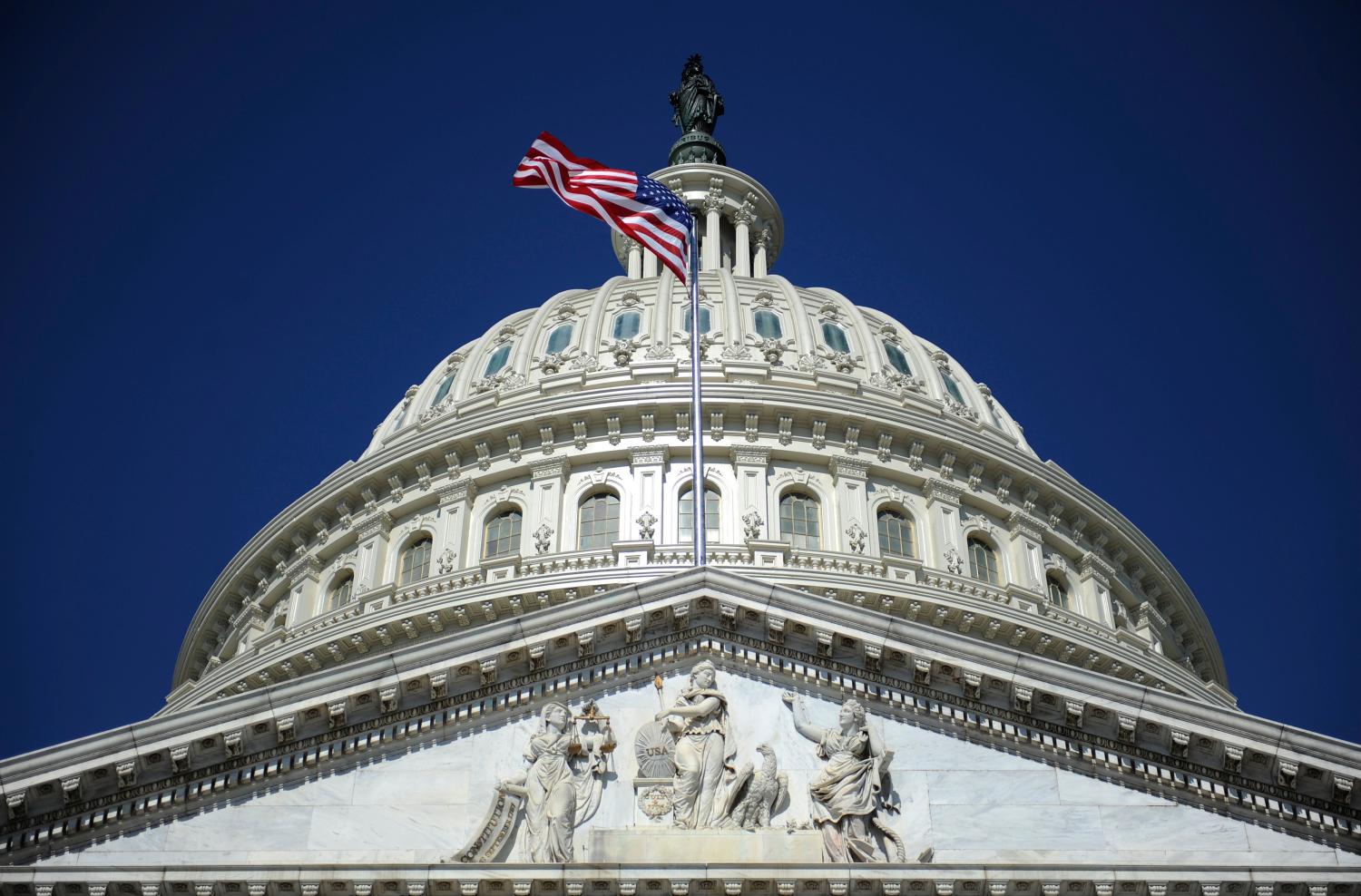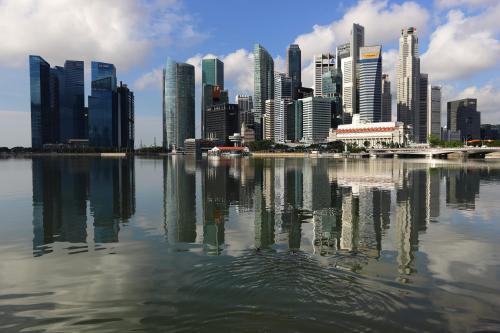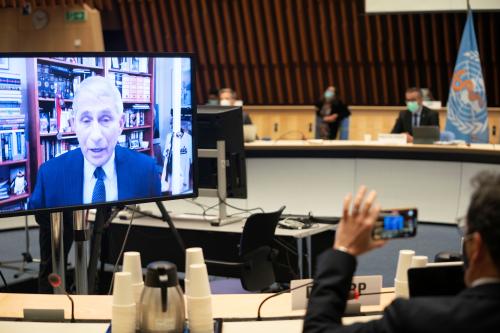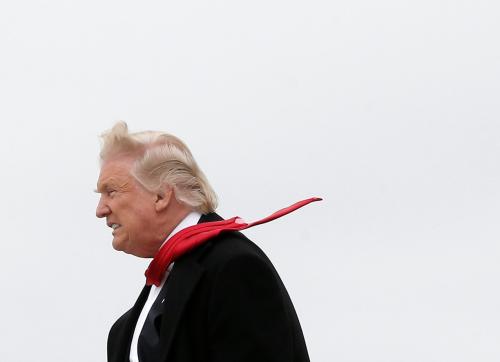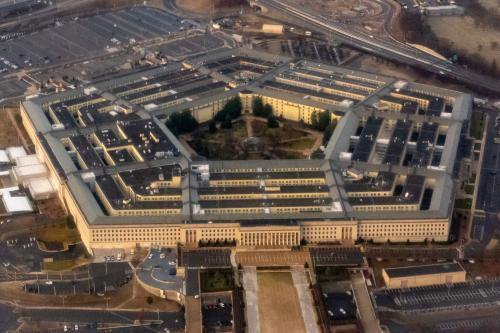The following text is the executive summary from “Democracy Playbook 2021: 10 Commitments for Advancing Democracy.” Download the full report here.
This special edition of our Democracy Playbook updates our 2019 compendium of evidence-based democracy best practices with the research and developments of the eventful past two years. Most importantly, we here extract from that rich body of knowledge ten proposed pro-democracy commitments for consideration by participants in the upcoming first Summit for Democracy on December 9-10, 2021, and the subsequent year of action. We break down each of the ten commitments into a series of specific and measurable steps that all stakeholders can undertake to renew and strengthen democracy, fight democratic backsliding, and usher in an era of improved governance. After the Summit, we will update the Playbook again with the best of the learnings from that gathering for use as we build towards the 2022 follow-up event a year from now.
The inaugural Summit for Democracy, to be hosted by President Biden and his administration, is a historic moment for the world’s governments, citizens, civil society, independent media, the private sector, labor, and more to focus and coordinate on our most pressing domestic and global governance, human rights, and security challenges. The perils of inaction are profound given the accelerated gains of autocrats, adversaries, enablers, and others who repress persons and weaken liberal and nascent democracies, commit human rights abuses, and expand corrosive corruption. These actors deliberately polarize people, create damaging divisions, and hinder collective efforts to address profound global challenges, including the increasingly devastating impacts of climate change and COVID-19. We applaud the Biden administration’s leadership and its democracy agenda, which has bipartisan and international support and seeks solutions to reverse illiberal trends and promote pro-democracy forces, and rightfully refuses to hand off problems to the next generation.
To meet this moment—and advance a democratic renewal locally, nationally, and globally as called for by President Biden—will require effort. That effort includes greater collaboration and deeper commitment from allies, leaders, and key stakeholders at the December event and the implementation of democracy agenda deliverables beyond 2021. The year of action between the December 2021 summit and the 2022 in-person summit provides critical momentum and an extended time frame for governments and pro-democracy forces to make good on commitments, build resilience, reverse backsliding, focus on good governance, and improve the lives of citizens at home while bolstering democracy globally.
In advancing these goals—key to peace, prosperity, and security—elected leaders, civil society, independent media, private sector elements, and other key partners on the frontlines of democracy globally are already beginning preparation for the 2021 summit. They do so with high expectations that leaders will “make both individual and collective commitments to defend democracy and human rights at home and abroad.”
“Tipping the balance in favor of democracy, human rights, and a more just and equitable world will require unrelenting persistence and hard work.”
Hence this Democracy Playbook: Democracy Summit Edition updates the 2019 first edition of the Playbook. This revision focuses on specific commitments and actions that governments and political actors, civil society, businesses, labor groups, international organizations, and other stakeholders in democracy and human rights across the globe can make in connection with the Summit. These commitments are backed by an extensive review of the social science literature and the practical experience of the past three decades, demonstrating that these pro-democracy measures can work when implemented with leadership and commitment. That is, these are measures that can make democratic institutions work more effectively and transparently for citizens, bolster resiliency, and halt and reverse democratic backsliding where it occurs (which is almost everywhere). The commitments are rooted in the relevant evidence and history: What the scholarship and practice of democracy over the decades since the end of the Cold War teach us about what can, and what does not, drive democracy forward.
We hope that the wide range of stakeholders participating in the Summit will find the analysis and evidence herein useful as they design catered, context-specific, pro-democracy commitments and deliverables. These commitments are also made as touchpoints for debate and to create space, platforms, and opportunities for meaningful action and collaboration whether for local, state, or national officials, civil society activists, journalists, private sector leaders, or citizens.
Tipping the balance in favor of democracy, human rights, and a more just and equitable world will require unrelenting persistence and hard work. As President Biden has said, “No democracy is perfect, and no democracy is ever final. Every gain made, every barrier broken, is the result of determined, unceasing work.”
We turn now to the “10 Commitments” for global democratic renewal—the thematic clusters of actionable initiatives. These are our proposals for consideration by all of the various stakeholders as they formulate their deliverables for the Summit. They are framed to be measurable undertakings so that progress can be assessed at the 2022 follow-up Summit for Democracy.
COMMITMENT 1: Strengthen and Ensure Election Security, Integrity, Transparency, and Voting Access
A. Commitments for State and Other Actors:
- Commitments for state actors:
- Commit to protecting and deterring undue internal (domestic) and external (international) interference in the stages of the election process (See p. 22).
- Invest in the people, administrative framework and election management bodies (EMBs), electoral jurisprudence, and systems required for the technological security, transparency, and accountability of election counting, voter registration, and political campaign networks. This should include infrastructure to protect against internal and external interference in elections (See p. 23).
- Commit to developing a proactive and comprehensive deterrence strategy—with responsible actors in clearly defined roles—that will appropriately punish nations, organizations, and individuals who interfere in the security of democratic elections (See p. 23).
- Commit to enacting policies and electoral processes that promote equality, universality, and transparency and protect broad access to the vote and election data (See p. 22).
- Commit to increasing transparency on the role of money in politics to restore or retain trust in the democratic system (See p. 25).
- Commitments for political opposition groups:
- Increase pre-election and election-day monitoring capacity, and, if electoral abuse has occurred, use the evidence as the basis for reform advocacy (See p. 36)
- Boost technical proficiency by partnering and collaborating with domestic and international organizations, including election observers, and involving them in the electoral process early (See p. 36)
- Make a commitment to contest acts of nondemocratic actors, within the bounds of democratic norms, who aim to sow distrust in elections. Opposition leaders may also choose to pursue more extreme institutional measures available to them such as investigations, impeachment processes, votes of no confidence, and recall referendums and/or deploy extra-institutional tools like protests, strikes, or boycotts (See p. 39)
- Commit to engaging new voters by presenting a positive and inclusive vision for the future (See p. 37)
- Commit to prepare for the use of diverse and varied nonviolent tactics to increase the pressure on government and attract more people to participate should there be an illegitimate election result (See p. 39).
B. Commitments for International Actors:
- Commit to observe elections together under the Organization for Security and Cooperation in Europe (OSCE) or other international umbrellas to meet basic standards of universal access, equality, fairness, freedom, transparency, accountability, and privacy in voter submission (See p. 87).
- Commit to enhance and increase international electoral assistance, overall engagement, and technical support to enhance electoral processes, transparency, accountability, and legal and administrative frameworks (See p. 87).
- Large foundations, international donors, and other partners should commit to collaborate with local NGOs such that external support to well-established, well-known, and Westernized organizations is balanced with cooperation with local entities that may lack the capacities of more established organizations in national capitals. Donors, partners, and regional networks should prioritize helping local NGOs develop basic core organizational capacities, especially financial management and human resources management (See p. 68).
C. Commitments for Nonprofit and Civil Society Actors:
- Strengthen nonpartisan election monitoring and increase efforts to restore citizen trust and confidence in both the electoral process and the overall foundations of democracy, transparency, and accountability, including by engaging the broader public audience (See p. 36).
- Strengthen the capacities and training of domestic NGOs and other local actors to successfully engage with government, including the opposition, to bolster legislative, administrative, and judicial electoral frameworks (See p. 75).
- Enhance collaboration with independent media to counter disinformation and ensure citizens can access transparent and truthful information as part of electoral processes (See p. 80).
- Be prepared to use diverse and varied nonviolent tactics to increase the pressure on government and attract more people to participate (See p. 46).
COMMITMENT 2: Advance Rule of Law and Impartial Justice
A. Use all available levers—such as diplomatic pressure, economic incentives, and standing in international organizations—to respond to efforts to compromise rule of law or judicial independence wherever they arise (See p. 62).
B. Defend the independence of the judiciary by establishing public procedures for the selection and retention of judges. These procedures should be transparent and based on objective criteria relating to the exercise of judicial office and focused primarily on ability and experience (See p. 31).
C. Implement and maintain government ethics and transparency mechanisms to enhance citizen trust in, and access to, the operation of government under law. With respect to the judicial system, that means establishing codes of conduct, opening up courtrooms by producing publicly available transcripts of proceedings in a timely fashion, taking steps to ensure that sealed documents are minimized, and placing cameras in courtrooms (See p. 32).
D. Advance prosecutorial independence as well, assuring that prosecutors are independent and insulated from political interference (See p. 33).
COMMITMENT 3: Depoliticize Democratic Processes
A. Commitments for State Actors:
- Practice and model responsible political behavior. Political actors should uphold international laws and institutional obligations and use their political power with restraint. But when norms break down, further legal mechanisms should be considered (See p. 26).
- Political parties, through their capacity to influence coalitions and internal leadership roles, should limit leaders who espouse anti-democratic sentiment or positions or who evince a disregard for human rights (See p. 28). Such behavior includes:
a. Rejection of (or weak commitment to) democratic rules of the game, including democratic elections.
b. Denial of the legitimacy of political opponents.
c. Toleration or encouragement of violence.
d. Readiness to curtail civil liberties of opponents, including civil society and the media. - Prospective anti-democratic leaders tend to demonstrate these behaviors within the confines of existing laws and powers. Political parties and leadership should respond by committing to use all legal and discretionary tools at their disposal to identify and challenge aspiring politicians who meet one or more of the above criteria (See p. 29).
B. Commitments for Nonprofit and Civil Society Actors:
- Model the responsible behavior civil society groups wish to see among their elected leaders in terms of good governance structure, rhetoric, and public positions (See p. 44).
- Make commitments and carry out activities, including with targeted and increased support from domestic and international partners, to depolarize democracy, strengthen resiliency, and create space for common ground among political actors (See p. 46).
COMMITMENT 4: Enhance Democratic Safeguards on Technology
A. Commitments for State Actors and Political Opposition Groups:
- Commit to establishing a common democratic agenda for regulating private industries that have an impact on democratic discourse and processes through close cooperation on regulatory efforts around data protection, content moderation, and export control reform (See p. 25).
- Commit to develop a global code of conduct to prevent the proliferation of technologies used for repression, unlawful surveillance, and other human rights violations (See p. 25).
- Political opposition groups should increase election monitoring capacity and be prepared to use electoral abuse evidence as the basis for reform advocacy (See p. 36).
B. Commitments for the Private Sector and Businesses:
- Develop industry best practices that incorporate accountability and transparency on sensitive technologies such as surveillance software and facial recognition (See p. 57).
- Social media companies specifically should commit to:
a. Prioritizing and supporting digital media literacy (See p. 58).
b. Supporting narrowly tailored, targeted government regulations that do not infringe on users’ right to free speech—focusing on mechanisms like political advertising and reduction of disinformation prevalence measures (See p. 59).
c. Intensifying cooperation with other platforms to share best practices (See p. 59).
d. Establishing better information with independent researchers and universities (See p. 59).
COMMITMENT 5: Strengthen Civil Society and Independent Media
A. Commitments for International, Nonprofit and Civil Society and Other Actors:
- External actors, including international donors, NGOs, and government officials should forcefully respond to government attacks on NGOs and independent media. That includes issuing systematic, coordinated, and high-level responses to government authorities’ restrictions on NGO activities and the work of free media, while taking steps to avoid the perception that activities are solely externally driven (See p. 69).
- International donors and governments should provide assistance and vocally promote laws that safeguard NGOs, activists, and the press to help create an environment that is conducive to their activities, especially in more supportive environments (See p. 69).
- NGOs should train and be prepared to use diverse and varied nonviolent tactics to increase the pressure on government and attract more people to participate (See p. 46).
B. Commitments for Independent Media:
- Strengthen professional development, training, and education to provide a pipeline to up-and-coming media actors able to notice and resist threats to the industry (See pp. 49, 70).
- Create professional associations to enable and support individual journalists on issues like professional values, employment conditions, security, legal questions, and editorial standards (See p. 50).
- Practice media self-scrutiny and develop a robust media criticism community. Such a community could increase public trust, and thus public support, through the transparent and constructive questioning of the relationship between journalists, politicians, and advertisers (See p. 50).
- Assume responsibility for improving their own internal governance, develop mechanisms to deal fairly with audience complaints, and develop work contracts to cover all employees to prevent self-censorship (See p. 50).
C. Commitments for State and International Actors Specifically Regarding Independent Media:
- Pledge to expand significantly overall assistance, programs, and agencies to support a sustained and top-level commitment to back media freedom. This should include increasing support for investigative journalism critical to combating corruption and to holding governments accountable (See pp. 24, 70).
- International donors should commit to funding legal assistance and establish specific funds to help media outlets protect against excessive defamation lawsuits (See p. 80).
- Support independent media organizations and NGOs working to expose disinformation campaigns using targeted funding. When abuses of public resources take place, the EU, United States, and democratic actors globally should take immediate steps to publicly condemn such behavior while pressing for government leaders to be held publicly responsible for their repressive actions (See p. 80).
- Review democracy and media support programs to ensure more direct funding to local NGOs and independent media, focusing primarily on operational “core” support such as staff time, physical and cyber security, and direct costs rather than project-based outcomes (See p. 80).
- Focus support and promote greater engagement and collaboration between independent media and NGOs to enhance efforts to promote greater accountability and transparency and to fight kleptocracy (See pp. 68, 70).
COMMITMENT 6: Avoid Toxic “Otherization” Politics
A. Commitments for All Democratic Actors:
- Those on both sides of critical issues should create space in the public square for legitimate and respectful debate. For example, there is a legitimate debate over migration levels that is very different from tolerating the anti-migrant and often anti-Muslim rhetoric that frequently uses xenophobic language to exploit refugee and migration crises (See p. 28).
- While substantive debates on policy issues should be welcomed, democratic actors must try to limit the extent to which debates over toxic identity politics poison democracy, weaken the trust of citizens in democratic governance and institutions, and serve as fuel to empower extremists. This effort needs to be matched with a focus on local, rural, and urban-level integration—as well as a posture that eschews hateful rhetoric (See p. 28).
- Address structural racism. Extremism and support for white supremacy are an acknowledged threat within the military, law enforcement, and other parts of the government. There must be a full lifecycle approach—from recruitment through return to civilian life—to preventing and mitigating the scourge of white nationalist, extremist, and other anti-democratic ideologies that exhibit a disregard for basic human rights (See p. 44).
B. Commitments for Government:
- In urban municipalities, systems are needed to better address inequality and long-term social service needs of urban populations, including in middle- and high-income countries. Moreover, new city-focused responses must enable a wide range of actors—local authorities, business leaders, academics, philanthropists, and development agencies—to provide input on decisions that affect their communities. This same effort must also focus on the inclusion of communities in rural and economically impacted areas to strengthen democracies in these communities and promote economic opportunities and equality (See pp. 68, 73).
- Tailor efforts to rural and underserved areas that are highly susceptible to radicalization due to a systemic lack of access to NGO and government support systems, thus allowing for anti-democratic extremist actors to fill the gap in community needs while promoting anti-democratic sentiment (See p. 59).
- Provide additional funding towards preemptive measures to prevent radicalization (See pp. 59, 69).
C. Commitments for International, Private Sector, and Other Actors:
- Democracies should enhance coordination on migration and refugee crises, as well as increase humanitarian support for civil society organizations and municipalities that are working to house and assist refugees (See p. 88).
- Private sector actors should seek affirmative ways to help protect democracy, including through activism, philanthropy, corporate social responsibility, and helpful rhetoric (See p. 55).
COMMITMENT 7: Prioritize Anti-Corruption and Anti-Kleptocracy Initiatives
A. Commitments for State Actors:
- Agree to regulate the role of money in politics to retain trust in the democratic system through the creation of such mechanisms as public financing of campaigns, disclosure requirements for donations, and limits on the amount of campaign donations (See p. 26).
- Agree to a common set of ethics and anti-corruption standards that surpass current international best practices. Set a timeline to implement standards (See p. 89).
- Pledge to adequately resource institutions and strengthen enforcement of laws and regulations designed to prevent money-laundering, other illicit finance, and corruption (See pp. 87, 89).
- Pledge that corruption-related financial crimes are not deprioritized relative to terrorism and narcotics (See p. 89).
- Promise to provide whistleblower protections and incentives, including in cross-border corruption cases (See p. 89).
B. Commitments for the Private Sector:
- Commit to resist any action that contributes to corruption, co-optation, or state capture (See p. 53).
- Corporations should pledge that their investment decisions are informed, principled, and sensitive to the country context, therefore avoiding providing a veneer of legitimacy to illiberal leaders (See p. 55).
- Pledge not to hire former government officials for positions that could contain a conflict of interest for a specific period of time following their service (See p. 56).
COMMITMENT 8: Demonstrate that Democracies Can Deliver a Better Standard of Living
A. Commit to policies of inclusive growth that tackle economic inequality and that improve well-being and opportunity across all demographic lines, including race, class, and geography (See p.44).
B. Such pro-growth policies for left-behind areas include extending broadband access, providing investment capital for new and small businesses, and using both transportation investment and regulatory policy to address rural-urban imbalances. Policies should address the unique needs of each area by elevating existing community assets and collaborations that bolster local economies (See p. 68).
C. Fix the problems that COVID-19 Vaccines Global Access (COVAX) has experienced, both to better address the COVID-19 vaccination distribution but also to prepare for the inevitable next pandemic (See p. 89).
D. Democratic states should collaborate to form a unified, coherent international effort that will be able to manage the large-scale ramifications of climate change including increases in natural disaster recovery, climate refugees, and infrastructure protection (See p. 89).
E. Democracies should more closely coordinate and collaborate on aid and investments in developing countries for greater coherence and impact. This could effectively limit authoritarian efforts to roll back democratic governance in developing countries and preserve democratic countries’ economic interests in developing markets (See p. 89).
COMMITMENT 9: Strengthen Democracy via Multilateral Institutions
A. Commitments for State Actors:
- The transatlantic community should lead the way by recommitting to core democracy principles, conditionality, and obligations as well as in other multilateral organizations, such as the European Union, NATO, and OSCE, that promote democracy and human rights. Opposition parties play a central role in keeping democratic commitments on track. Social science research has shown they can persuade government parties to implement democratic reforms (See pp. 36, 87).
- Create a unified democratic opposition where possible or consider using referendums as an alternative, being mindful that referendums may not always be the best option and can often backfire (as with Brexit). The opposition’s formation of a coalition is the best predictor of a positive result in elections in competitive authoritarian regimes (See p. 36).
- Identify and confront authoritarians’ tactics to influence multilateral institutions from within by critically evaluating candidates for key roles, developing mechanisms to prevent unilateral blocking of human rights initiatives, and building a long-term strategy to ensure that multilateral institutions do not become an instrument for an anti-democratic agenda (See p. 87).
B. Commitments for International Actors:
- Pledge to use conditionality more aggressively—both punitive and incentive-based—against backsliding democracies and malign actors, including efforts to combat corruption. To continue with the transatlantic example, the EU has powerful tools of conditionality that it can use to incentivize both member states and nonmember states, such as the exclusion or expulsion from EU programs. This should include cutting funding to the worst offenders (See p. 86).
- International organizations should pledge to invest in and expand capabilities for monitoring disinformation campaigns emanating from foreign actors (See p. 81).
COMMITMENT 10: Build and Deepen a Broad-Based Global Coalition of Democracies
A. Democracies should commit to increase coordination and cooperation with each other in defense of the key elements of the multilateral order, including strengthening standing local, regional, or global democratic institutions and frameworks or expanding or creating new mechanisms for advanced democratic collaboration (See p. 87).
B. The democracies of the world should recommit to working together within multilateral forums to advance common positions and to more effectively compete for leadership positions of international organizations (See p. 81).
-
Acknowledgements and disclosures
This report is a collaboration of Governance Studies at The Brookings Institution, the German Marshall Fund of the United States, the Center for European Policy Analysis, the Transatlantic Democracy Working Group, the FACT Coalition, and the Leveraging Transparency to Reduce Corruption (LTRC) initiative. The authors wish to thank Daniel Berger and other donors for their generous support for this update of the original Democracy Playbook and to the BHP Foundation for their support of LTRC, a joint initiative of the Brookings Institution and Results for Development that informed some of the reflections regarding effective transparency, accountability, and participation approaches presented in this report. The authors are also grateful to other individuals who were instrumental in its research, writing, and publication. Colby Galliher is a research analyst and project coordinator in the Governance Studies program at the Brookings Institution. Madison Gee is, and Catherine Conrow was, a project and research assistant in Governance Studies at Brookings. Rachel Carroll Rivas is a senior research analyst lead at the Southern Poverty Law Center’s Intelligence Project Department. Edison Forman, Alivia Kiefer, Cyndi Lai, and Taylor Redd were interns in the Governance Studies program at Brookings in Fall 2021. Elias Kaul, Ishita Krishan, Rakhi Kundra, and Luis Neuner were interns in the Governance Studies program at Brookings in Summer 2021. Each of these individuals provided indispensable research, editing, or other support. The authors would also like to thank Jessica Harris, Kelly Parsons, and Kevin Han at Brookings for their work on the production and promotion of this report. Brookings’s John Allen, Darrell West, and Courtney Dunakin supported this project in a myriad of ways and the authors are grateful.
The Brookings Institution is committed to quality, independence, and impact.
We are supported by a diverse array of funders. In line with our values and policies, each Brookings publication represents the sole views of its author(s).


